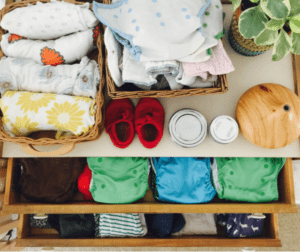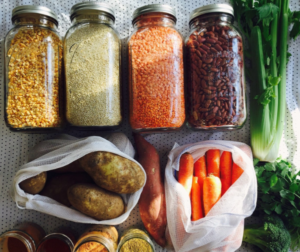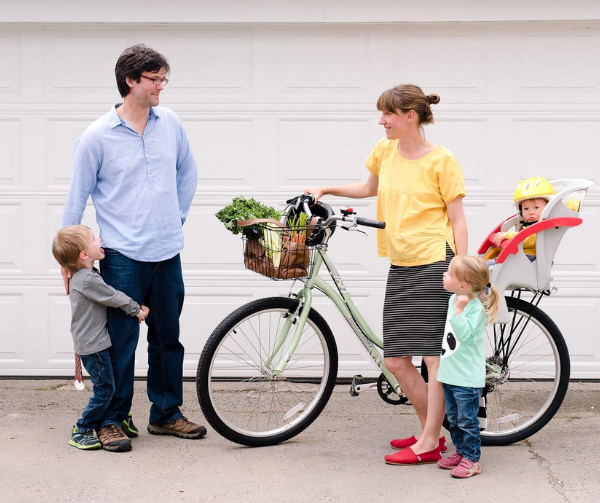Did you know that the carbon impact of a child born in the US is more than 160 times the impact of a child born in Bangladesh? When you consider for a second the dramatic differences in lifestyle, culture, and access to material goods, it comes as no surprise. In a new study published in the Journal of Environmental Research Letters, having kids is described as being the most polluting thing people can do to the planet. While this news may not compel you to adjust your planned family size, it might motivate you to adopt some family lifestyle changes to reduce your environmental impact.
10 Ways Your Family Can Reduce Your Environmental Impact
1) Diapers

From birth to potty training, babies use approximately 6,000 diapers. Did you know that disposables can take up to 500 years to decompose? Our family uses an eclectic bunch of used, hand-me-down cloth diapers, each helping to divert one disposable away from landfill. If used long-term (on several kids) they will also save you money!
baby wipes. They may offer momentary convenience, but they wreak global havoc in sewers and oceans. Ditch the disposables and use cloth wipes. Buy them or just cut up and use old muslin cloths to make reusable ones.
2) Clothes
Babies grow incredibly fast and don’t care what they wear. Your little ones can still look adorable wearing preworn clothes, saving you money and reducing textile waste. If buying new clothes, reduce your environmental impact by choosing organic, natural fibers made by ethical, fair trade sustainable brands.
3) Gear
Strollers, slings, etc, can also be purchased used. Swap with friends, buy/sell at local consignment stores, or check out your local buy-nothing Facebook group. The only two items I recommend to buy new (unless you already have them from another kiddie) are mattresses and car seats. If you must purchase new gear, reduce your environmental impact by buying buy high-quality, durable pieces made from sustainable, low toxicity materials, and use for several kids.
4) Body Products
Keep it simple. Avoid single-use plastic and chemicals in favor of natural products. We use only coconut oil as a bum/diaper cream and skin moisturizer. Making your own products from natural and perfume-free basics such as coco butter, coconut oil, and shea butter offers easy and cheap alternatives to products purchased in single-use plastic containers.
5) Toys
Kids grow so fast, and their favorite toys change frequently. Why not buy used or swap with friends? Buy less, and down the line you will realize the importance of owning fewer toys. Get a library card for a constant supply of great new books as your little people grow. If you do buy toys, reduce your environmental impact by investing in sustainably-made wooden toys.

6) Food
Eat a more plant-based diet. Shifting away from dairy and meat is the single most effective way to regenerate our ecosystems and prevent its destruction. Livestock production is the single largest contributor of emissions around the globe. Reduce your meat consumption and purchase locally-grown food from farmers markets. Make your own baby food instead of single-use manufactured pouches and jars. Try baby led weaning, where you allow your baby (6 months+) to feed themselves whole foods.
7 ) Host Zero-Waste Birthday Parties
Have you ever stopped to consider the amount of garbage produced from just one party? Try using reusable crockery and cutlery, skip the party bags, and make a homemade cake to reduce your environmental impact. Ask guests not to bring gifts or to bring homemade ones or donate to a charity online on your kiddies’ behalf.
8) Litter-Less
Rather than purchasing processed snacks in single-use plastic containers and packages, buy items in bulk which can be put into smaller, reusable bags. Reduce your environmental impact by making homemade snacks from ingredients bought in bulk and reusable produce bags. Use reusable drinking bottles and lunch boxes.
9) Breastfeeding
Breastfeeding produces zero waste, zero greenhouse gases, and has a zero-water imprint. While Formula feeding offers a much-needed substitute for breastmilk when women or babies can’t breastfeed or choose not to, infant formula is a $70 billion dollar industry with a corporate interest and environmental consequences. Choose a brand which uses organic ingredients from sustainable sources, are packaged responsibly, and is made by a social and environmental mission-minded company.
10) Transportation
Use public transport where possible. For short local trips, use the stroller or bicycle with a kiddie trailer or baby bike seat!

Be conscious of the choices your family makes and their impact. You can significantly reduce the environmental impact your little one(s) have and save yourself lots of money in the process. In what ways is your family helping to reduce its environmental impact?


















